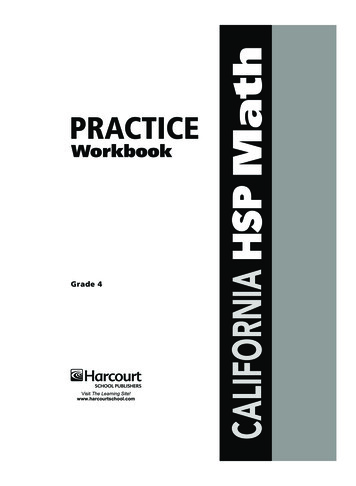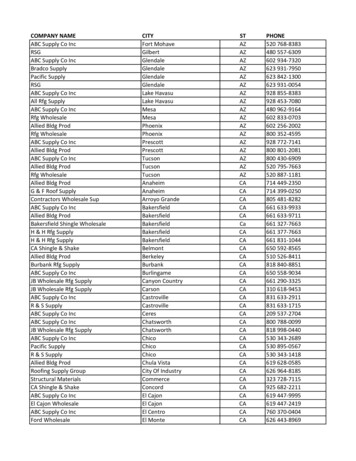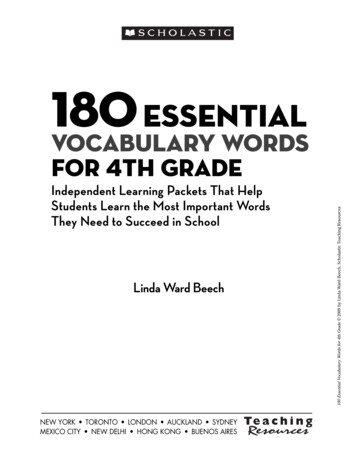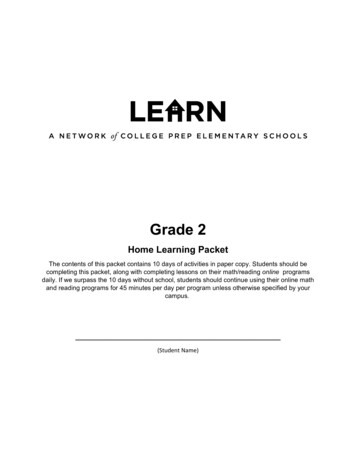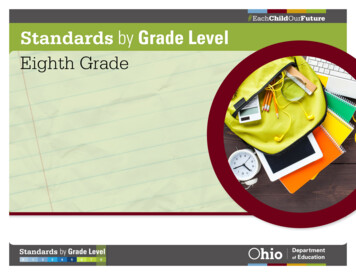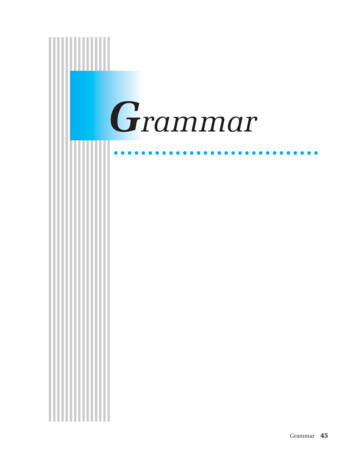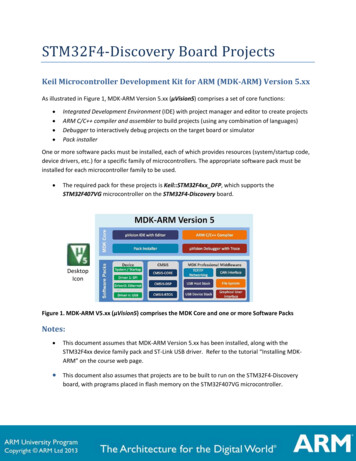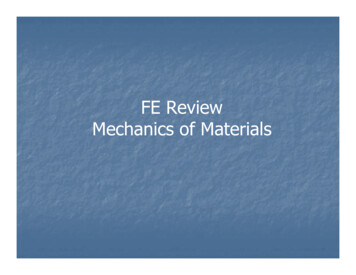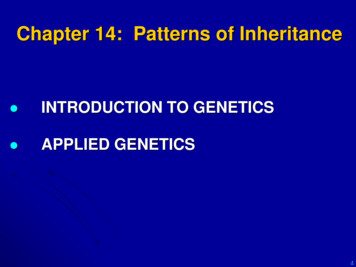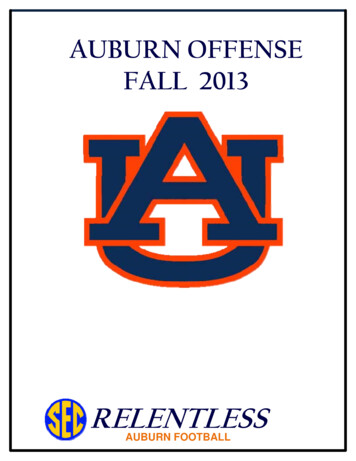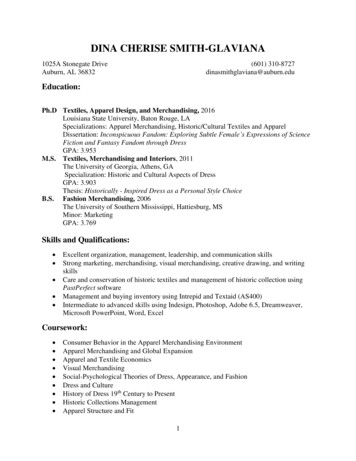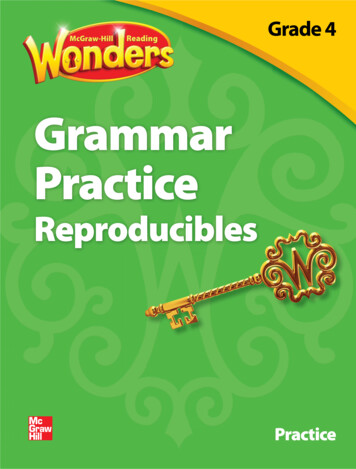
Transcription
Grade 4GrammarPracticeReproduciblesPractice
Copyright The McGraw-Hill Companies, Inc. Permission is granted to reproduce for classroom use.Grade 4GrammarPracticeReproduciblesPractice
Grade 4GrammarPracticeReproduciblesBothell, WA Chicago, IL Columbus, OH New York, NY
www.mheonline.com/readingwondersCopyright The McGraw-Hill Companies, Inc.All rights reserved. The contents, or parts thereof, may bereproduced in print form for non-profit educational use withReading Wonders, provided such reproductions bear copyrightnotice, but may not be reproduced in any form forany other purpose without the prior written consent of TheMcGraw-Hill Companies, Inc., including, but not limited to,network storage or transmission, or broadcast for distancelearning.Send all inquiries to:McGraw-Hill EducationTwo Penn PlazaNew York, NY 10121C
ContentsUnit 1 Think It ThroughClever IdeasSentences . . . . . . . . . . . . . . . . . . . . . . . . . . . . . . . . . . .Sentences . . . . . . . . . . . . . . . . . . . . . . . . . . . . . . . . . . .Mechanics . . . . . . . . . . . . . . . . . . . . . . . . . . . . . . . . . . .Proofreading . . . . . . . . . . . . . . . . . . . . . . . . . . . . . . . . .Test: Sentences . . . . . . . . . . . . . . . . . . . . . . . . . . . . . .12345Think of OthersSubjects and Predicates . . . . . . . . . . . . . . . . . . . . . . . 6Subjects and Predicates . . . . . . . . . . . . . . . . . . . . . . . 7Mechanics . . . . . . . . . . . . . . . . . . . . . . . . . . . . . . . . . . . 8Proofreading . . . . . . . . . . . . . . . . . . . . . . . . . . . . . . . . . 9Test: Subjects and Predicates . . . . . . . . . . . . . . . . . 10Take ActionCompound Sentences . . . . . . . . . . . . . . . . . . . . . . .Compound Sentences . . . . . . . . . . . . . . . . . . . . . . .Mechanics . . . . . . . . . . . . . . . . . . . . . . . . . . . . . . . . . .Proofreading . . . . . . . . . . . . . . . . . . . . . . . . . . . . . . . .Test: Compound Sentences . . . . . . . . . . . . . . . . . .1112131415Clauses and Complex Sentences . . . . . . . . . . . . .Clauses and Complex Sentences . . . . . . . . . . . . .Mechanics . . . . . . . . . . . . . . . . . . . . . . . . . . . . . . . . . .Proofreading . . . . . . . . . . . . . . . . . . . . . . . . . . . . . . . .Test: Clauses and Complex Sentences . . . . . . . .1617181920Run-On Sentences . . . . . . . . . . . . . . . . . . . . . . . . . .Run-On Sentences . . . . . . . . . . . . . . . . . . . . . . . . . .Mechanics . . . . . . . . . . . . . . . . . . . . . . . . . . . . . . . . . .Proofreading . . . . . . . . . . . . . . . . . . . . . . . . . . . . . . . .Test: Run-On Sentences . . . . . . . . . . . . . . . . . . . . .2122232425Copyright The McGraw-Hill Companies, Inc.Ideas in MotionTIME For Kidsiii
ContentsContentsUnit 2 Amazing AnimalsLiterary LessonsCommon and Proper Nouns . . . . . . . . . . . . . . . . . .Common and Proper Nouns . . . . . . . . . . . . . . . . . .Mechanics . . . . . . . . . . . . . . . . . . . . . . . . . . . . . . . . . .Proofreading . . . . . . . . . . . . . . . . . . . . . . . . . . . . . . . .Test: Common and Proper Nouns . . . . . . . . . . . . .2627282930Singular and Plural Nouns . . . . . . . . . . . . . . . . . . . .Singular and Plural Nouns . . . . . . . . . . . . . . . . . . . .Mechanics . . . . . . . . . . . . . . . . . . . . . . . . . . . . . . . . . .Proofreading . . . . . . . . . . . . . . . . . . . . . . . . . . . . . . . .Test: Singular and Plural Nouns . . . . . . . . . . . . . . .3132333435Irregular Plural Nouns . . . . . . . . . . . . . . . . . . . . . . . .Irregular Plural Nouns . . . . . . . . . . . . . . . . . . . . . . . .Mechanics . . . . . . . . . . . . . . . . . . . . . . . . . . . . . . . . . .Proofreading . . . . . . . . . . . . . . . . . . . . . . . . . . . . . . . .Test: Irregular Plural Nouns . . . . . . . . . . . . . . . . . . .3637383940Possessive Nouns . . . . . . . . . . . . . . . . . . . . . . . . . . .Possessive Nouns . . . . . . . . . . . . . . . . . . . . . . . . . . .Mechanics . . . . . . . . . . . . . . . . . . . . . . . . . . . . . . . . . .Proofreading . . . . . . . . . . . . . . . . . . . . . . . . . . . . . . . .Test: Possessive Nouns . . . . . . . . . . . . . . . . . . . . . .4142434445Combining Sentences . . . . . . . . . . . . . . . . . . . . . . . .Combining Sentences . . . . . . . . . . . . . . . . . . . . . . . .Mechanics . . . . . . . . . . . . . . . . . . . . . . . . . . . . . . . . . .Proofreading . . . . . . . . . . . . . . . . . . . . . . . . . . . . . . . .Test: Combining Sentences . . . . . . . . . . . . . . . . . . .4647484950Animals in FictionNatural ConnectionsAdaptationsivCopyright The McGraw-Hill Companies, Inc.Animals All Around
Unit 3 That’s the Spirit!FriendshipAction Verbs . . . . . . . . . . . . . . . . . . . . . . . . . . . . . . . .Action Verbs . . . . . . . . . . . . . . . . . . . . . . . . . . . . . . . .Mechanics . . . . . . . . . . . . . . . . . . . . . . . . . . . . . . . . . .Proofreading . . . . . . . . . . . . . . . . . . . . . . . . . . . . . . . .Test: Action Verbs . . . . . . . . . . . . . . . . . . . . . . . . . . .5152535455Helping the CommunityVerb Tenses . . . . . . . . . . . . . . . . . . . . . . . . . . . . . . . . .Verb Tenses . . . . . . . . . . . . . . . . . . . . . . . . . . . . . . . .Mechanics . . . . . . . . . . . . . . . . . . . . . . . . . . . . . . . . . .Proofreading . . . . . . . . . . . . . . . . . . . . . . . . . . . . . . . .Test: Verb Tenses . . . . . . . . . . . . . . . . . . . . . . . . . . .5657585960Main and Helping Verbs . . . . . . . . . . . . . . . . . . . . . .Main and Helping Verbs . . . . . . . . . . . . . . . . . . . . . .Mechanics . . . . . . . . . . . . . . . . . . . . . . . . . . . . . . . . . .Proofreading . . . . . . . . . . . . . . . . . . . . . . . . . . . . . . . .Test: Main and Helping Verbs . . . . . . . . . . . . . . . . .6162636465Linking Verbs . . . . . . . . . . . . . . . . . . . . . . . . . . . . . . .Linking Verbs . . . . . . . . . . . . . . . . . . . . . . . . . . . . . . .Mechanics . . . . . . . . . . . . . . . . . . . . . . . . . . . . . . . . . .Proofreading . . . . . . . . . . . . . . . . . . . . . . . . . . . . . . . .Test: Linking Verbs . . . . . . . . . . . . . . . . . . . . . . . . . .6667686970Irregular Verbs . . . . . . . . . . . . . . . . . . . . . . . . . . . . . .Irregular Verbs . . . . . . . . . . . . . . . . . . . . . . . . . . . . . .Mechanics . . . . . . . . . . . . . . . . . . . . . . . . . . . . . . . . . .Proofreading . . . . . . . . . . . . . . . . . . . . . . . . . . . . . . . .Test: Irregular Verbs . . . . . . . . . . . . . . . . . . . . . . . . .7172737475Liberty and JusticeCopyright The McGraw-Hill Companies, Inc.Powerful WordsTIME For Kidsv
ContentsContentsUnit 4 Fact or Fiction?Our GovernmentPronouns and Antecedents . . . . . . . . . . . . . . . . . . .Pronouns and Antecedents . . . . . . . . . . . . . . . . . . .Mechanics . . . . . . . . . . . . . . . . . . . . . . . . . . . . . . . . . .Proofreading . . . . . . . . . . . . . . . . . . . . . . . . . . . . . . . .Test: Pronouns and Antecedents . . . . . . . . . . . . . .7677787980Types of Pronouns . . . . . . . . . . . . . . . . . . . . . . . . . . .Types of Pronouns . . . . . . . . . . . . . . . . . . . . . . . . . . .Mechanics . . . . . . . . . . . . . . . . . . . . . . . . . . . . . . . . . .Proofreading . . . . . . . . . . . . . . . . . . . . . . . . . . . . . . . .Test: Types of Pronouns . . . . . . . . . . . . . . . . . . . . . .8182838485Pronoun-Verb Agreement . . . . . . . . . . . . . . . . . . . . .Pronoun-Verb Agreement . . . . . . . . . . . . . . . . . . . . .Mechanics . . . . . . . . . . . . . . . . . . . . . . . . . . . . . . . . . .Proofreading . . . . . . . . . . . . . . . . . . . . . . . . . . . . . . . .Test: Pronoun-Verb Agreement . . . . . . . . . . . . . . . .8687888990Possessive Pronouns . . . . . . . . . . . . . . . . . . . . . . . .Possessive Pronouns . . . . . . . . . . . . . . . . . . . . . . . .Mechanics . . . . . . . . . . . . . . . . . . . . . . . . . . . . . . . . . .Proofreading . . . . . . . . . . . . . . . . . . . . . . . . . . . . . . . .Test: Possessive Pronouns . . . . . . . . . . . . . . . . . . .9192939495LeadershipBreakthroughsWonders in the SkyPronouns and Homophones . . . . . . . . . . . . . . . . . . 96Pronouns and Homophones . . . . . . . . . . . . . . . . . . 97Mechanics . . . . . . . . . . . . . . . . . . . . . . . . . . . . . . . . . . 98Proofreading . . . . . . . . . . . . . . . . . . . . . . . . . . . . . . . . 99Test: Pronouns and Homophones . . . . . . . . . . . . 100viCopyright The McGraw-Hill Companies, Inc.Achievements
Unit 5 Figure It OutMaking It HappenAdjectives . . . . . . . . . . . . . . . . . . . . . . . . . . . . . . . . .Adjectives . . . . . . . . . . . . . . . . . . . . . . . . . . . . . . . . .Mechanics . . . . . . . . . . . . . . . . . . . . . . . . . . . . . . . . .Proofreading . . . . . . . . . . . . . . . . . . . . . . . . . . . . . . .Test: Adjectives . . . . . . . . . . . . . . . . . . . . . . . . . . . .101102103104105Articles . . . . . . . . . . . . . . . . . . . . . . . . . . . . . . . . . . . .Articles . . . . . . . . . . . . . . . . . . . . . . . . . . . . . . . . . . . .Mechanics . . . . . . . . . . . . . . . . . . . . . . . . . . . . . . . . .Proofreading . . . . . . . . . . . . . . . . . . . . . . . . . . . . . . .Test: Articles . . . . . . . . . . . . . . . . . . . . . . . . . . . . . . .106107108109110Adjectives That Compare . . . . . . . . . . . . . . . . . . . .Adjectives That Compare . . . . . . . . . . . . . . . . . . . .Mechanics . . . . . . . . . . . . . . . . . . . . . . . . . . . . . . . . .Proofreading . . . . . . . . . . . . . . . . . . . . . . . . . . . . . . .Test: Adjectives That Compare . . . . . . . . . . . . . . .111112113114115Comparing with More and Most . . . . . . . . . . . . . .Comparing with More and Most . . . . . . . . . . . . . .Mechanics . . . . . . . . . . . . . . . . . . . . . . . . . . . . . . . . .Proofreading . . . . . . . . . . . . . . . . . . . . . . . . . . . . . . .Test: Comparing with More and Most . . . . . . . . .116117118119120Comparing with Good and Bad . . . . . . . . . . . . . .Comparing with Good and Bad . . . . . . . . . . . . . .Mechanics . . . . . . . . . . . . . . . . . . . . . . . . . . . . . . . . .Proofreading . . . . . . . . . . . . . . . . . . . . . . . . . . . . . . .Test: Comparing with Good and Bad . . . . . . . . .121122123124125On the MoveInventionsCopyright The McGraw-Hill Companies, Inc.Zoom InTIME For Kidsvii
ContentsContentsUnit 6 Past, Present, and FutureOld and NewAdverbs . . . . . . . . . . . . . . . . . . . . . . . . . . . . . . . . . . .Adverbs . . . . . . . . . . . . . . . . . . . . . . . . . . . . . . . . . . .Mechanics . . . . . . . . . . . . . . . . . . . . . . . . . . . . . . . . .Proofreading . . . . . . . . . . . . . . . . . . . . . . . . . . . . . . .Test: Adverbs . . . . . . . . . . . . . . . . . . . . . . . . . . . . . .126127128129130Comparing with Adverbs . . . . . . . . . . . . . . . . . . . .Comparing with Adverbs . . . . . . . . . . . . . . . . . . . .Mechanics . . . . . . . . . . . . . . . . . . . . . . . . . . . . . . . . .Proofreading . . . . . . . . . . . . . . . . . . . . . . . . . . . . . . .Test: Comparing with Adverbs . . . . . . . . . . . . . . .131132133134135Negatives . . . . . . . . . . . . . . . . . . . . . . . . . . . . . . . . . .Negatives . . . . . . . . . . . . . . . . . . . . . . . . . . . . . . . . . .Mechanics . . . . . . . . . . . . . . . . . . . . . . . . . . . . . . . . .Proofreading . . . . . . . . . . . . . . . . . . . . . . . . . . . . . . .Test: Negatives . . . . . . . . . . . . . . . . . . . . . . . . . . . . .136137138139140Prepositions . . . . . . . . . . . . . . . . . . . . . . . . . . . . . . . .Prepositions . . . . . . . . . . . . . . . . . . . . . . . . . . . . . . . .Mechanics . . . . . . . . . . . . . . . . . . . . . . . . . . . . . . . . .Proofreading . . . . . . . . . . . . . . . . . . . . . . . . . . . . . . .Test: Prepositions . . . . . . . . . . . . . . . . . . . . . . . . . . .141142143144145Using Prepositions . . . . . . . . . . . . . . . . . . . . . . . . . .Using Prepositions . . . . . . . . . . . . . . . . . . . . . . . . . .Mechanics . . . . . . . . . . . . . . . . . . . . . . . . . . . . . . . . .Proofreading . . . . . . . . . . . . . . . . . . . . . . . . . . . . . . .Test: Using Prepositions . . . . . . . . . . . . . . . . . . . . .146147148149150Notes from the PastResourcesMoney MattersviiiCopyright The McGraw-Hill Companies, Inc.Finding My Place
Grammar: SentencesName A sentence is a group of words that shows a complete thought. A sentence fragment is a group of words that does not showa complete thought. Every sentence begins with a capital letter and ends witha punctuation mark.Read each group of words. On the lines provided, write sentence ifthe group of words forms a sentence. Write fragment if it does not forma sentence.1. There are many stars in the sky.2. Brought it into the kitchen.3. My classroom at school.4. Did you see the rabbit?Copyright The McGraw-Hill Companies, Inc.5. I can jump very high.6. Great day!7. The student was late.8. Laughing loudly at the joke.9. Do you want to play a game?10. I think we won!Grammar Grade 4 Unit 1 Week 11
Grammar: Types of SentencesName A sentence shows a complete thought. A sentence fragment does not. A statement is a sentence that tells something. A question is a sentence that asks something. A command is a sentence that tells someone to do something. An exclamation is a sentence that expresses surprise, excitement,or a strong feeling.Read each group of words. Underline the group of words that is a sentence.Then write statement, question, command, or exclamation to name the typeof sentence it is.1. Live far away from me. / You live far away.2. Is it in here? / The book in here?3. This is the best gift ever! / Best gift I ever got!4. The button when the light comes on. / Push the button quickly.6. The tallest building in the world! / That is the tallest building!7. Red backpack today. / My backpack ripped.8. The name of your teacher? / Who is your teacher?9. Finish your dinner. / Eating dinner.10. Will be there. / We will arrive soon.2 Grammar Grade 4 Unit 1 Week 1Copyright The McGraw-Hill Companies, Inc.5. How old is your cousin? / Your cousin’s age?
Grammar: Sentence PunctuationName Every sentence begins with a capital letter. A statement ends with a period. (.) A question ends with a question mark. (?) A command ends with a period or an exclamation mark. (. or !) An exclamation ends with an exclamation mark. (!)Write each sentence correctly using capital letters and end punctuation.Label each sentence as a statement, question, command, or exclamation.1. put the bottle in the bin outside2. who is your favorite actorCopyright The McGraw-Hill Companies, Inc.3. the snow sticks to the tree branches4. how many push-ups can you do in a row5. the beautiful fireworks are an awesome sightGrammar Grade 4 Unit 1 Week 13
Grammar: ProofreadName A sentence shows a complete thought. A sentence fragment does not. A statement is a sentence that tells something. A question is asentence that asks something. A command is a sentence that tells someone to do something.An exclamation is a sentence that expresses a strong feeling. Every sentence begins with a capital letter and ends with a period,question mark, or exclamation mark.Rewrite the paragraphs below, correcting any mistakes you might find.1. today was the best day ever? woke up to find that it snowed last night. Wasno school! I made a snowman with my sister. then we went sledding?3. I wrote a science report about the desert! Wrote about the weather and theanimals that live there. now I want to visit the desert to see it in person? whatplace would you like to see?4Grammar Grade 4 Unit 1 Week 1Copyright The McGraw-Hill Companies, Inc.2. Have you ever made a peanut butter and jelly sandwich. is really easy. Spreadpeanut butter on one slice of bread? then spread jelly on the other slice. Thetwo slices together. now you have a delicious sandwich!
Grammar: SentencesNameA. Circle the letter of the group of words that is a complete sentence.1. a. Knows the answer.b. Have you ever?c. The ripe and delicious apple!d. My friend can swim.2. a. Our first trip to the beach.b. What is your name?c. Blue sky so perfect!d. Rolls happily in the grass.B. Decide if the sentence is a statement, question, command, orexclamation. Write your answer next to the sentence. Then rewrite thesentence using the correct punctuation and capitalization.3. bring me a pencil from the deskCopyright The McGraw-Hill Companies, Inc.4. can you read all of the words on the page5. i won first prize in the art contest6. the dog needs a bath today7. do you want to go to the library with meGrammar Grade 4 Unit 1 Week 15
Grammar: Subjects and PredicatesName The subject names the person or thing the sentence is about. A simplesubject is the main noun or pronoun in the complete subject. The predicate tells what the subject is or does. The simple predicate isthe main verb or verb phrase in the complete predicate.A. Read each sentence and circle the complete subject. Then write thesimple subject on the line provided.1. The young boy rode the bus to school.2. My teacher Mrs. Hill likes museums.3. The two playful children made up a new game.4. My sister’s friend Ana plays soccer.5. The friendly dog ran very fast.B. Read each sentence and circle the complete predicate. Then write thesimple predicate on the line provided.7. My brother Ken collects old stamps.8. I cooked a delicious dinner.9. Mom works hard all day.10. The shy rabbit hopped away quickly.6 Grammar Grade 4 Unit 1 Week 2Copyright The McGraw-Hill Companies, Inc.6. We walked to the park.
Grammar: Compound Subjects and PredicatesName The subject names the person or thing the sentence is about. Thepredicate tells what the subject is or does. A compound subject is two or more subjects with the same predicate.The subjects are usually joined by and or or. A compound predicate is two or more predicates with the samesubject. The simple predicates in a compound predicate are usuallyjoined by and, but, or or.Read each sentence. Underline the compound subject or compoundpredicate. Then write compound subject or compound predicate on theline provided.1. The cat and dog get along very well.2. Mom and Dad rented a car for the vacation.3. We could drive or walk to school.Copyright The McGraw-Hill Companies, Inc.4. My little sisters whine, fuss, and cry at bedtime.5. Aunt Eileen and Uncle Will live down the block.6. The sick child complained but went to the doctor.7. The earth settles and hardens over time.8. Henry, Noah, or Lin will win first prize.9. The teachers and students crowded into the auditorium.10. Did you draw a picture or use the clay?Grammar Grade 4 Unit 1 Week 27
Grammar: Punctuate Compound Subjects and PredicatesName If a compound subject has two subjects, the subjects are not separatedby a comma. If it has three or more subjects, they are separated bycommas. If a compound predicate has two predicates, the predicates are notseparated by a comma. If it has three or more predicates, they areseparated by commas.Read each sentence. Decide if the compound subject or compoundpredicate needs commas. If it does, rewrite the sentence correctly on theline provided. If it does not, write No change needed on the line.1. My mother my cousin and I went to the store together.2. We all sat ate and drank at the dinner table.3. Miguel dove off the diving board and swam across the pool.5. She was hungry but found nothing in the refrigerator.6. I ran to the closet grabbed my coat and hurried out the door.8Grammar Grade 4 Unit 1 Week 2Copyright The McGraw-Hill Companies, Inc.4. The gray horse brown horse or black horse will win the race.
Grammar: ProofreadName The subject names the person or thing the sentence is about. A simplesubject is the main noun or pronoun in the complete subject. The predicate tells what the subject is or does. The simple predicate isthe main verb or verb phrase in the complete predicate. A compound subject is two or more subjects with the same predicate.If a compound subject has three or more subjects, the subjects areseparated by commas. A compound predicate is two or more predicates with the samesubject. If a compound predicate has three or more predicates, thepredicates are separated by commas.Rewrite the sentences below, adding commas and correcting mistakesin punctuation.1. The flags banner or ribbons will blow away in the storm.Copyright The McGraw-Hill Companies, Inc.2. Did the ranger call in and record his status on the way up the trail.3. The baby robins tweeted, cried and called for their mother.4. Regan Katrina, and I watched the amazing sight above us.5. How long can we continue to sit but not talk, during the movie!6. The badger and the snake circled bit and fought with each other.Grammar Grade 4 Unit 1 Week 29
Grammar: Subjects and PredicatesNameA. Match the circled part of each sentence on the left with the correct namefor it on the right.1. The rain falls heavily on the roof.simple subject2. Our teacher Mr. Rye volunteered.simple predicate3. I broke my favorite toy.complete subject4. The red cap floated in the breeze.complete predicateB. Circle the letter of the sentence that has a compound subjector compound predicate.5. a. Do you read or write Spanish?b. I finished my homework early.c. My friends go to a different school.d. She ate the tasty crackers at lunch.6. a. My father goes on business trips.b. Elsie practices her flute every day.d. Rocks and shells collect on the shore.10Grammar Grade 4 Unit 1 Week 2Copyright The McGraw-Hill Companies, Inc.c. Mom’s plants grow best in the sunlight.
Grammar: Simple and Compound SentencesName A clause is a group of words that has a subject and a verb. An independent clause can stand alone as a sentence. A simple sentence has one independent clause. A compound sentence has two or more independent clauses.Read each sentence. On the lines provided, write simple if it has oneindependent clause. Write compound if it has two or more independentclauses.1. I wanted to go to the concert, but my parents wouldn’t let me.2. Mrs. Gupta lives on a very busy road in the middle of the city.3. He got a hot dog, she got a hamburger, and you got a salad.4. Can we go to the movies later this evening?5. There are too many stars in the sky to count all of them.Copyright The McGraw-Hill Companies, Inc.6. The little puppy was adopted quickly, for it was very sweet.7. The balloon drifted up into the fluffy clouds above.8. We left early, yet the traffic on the highway still made us late.9. Do you want to read a book, or would you like to take a walk?10. My cousin thinks he was lucky to get into his favorite college.Grammar Grade 4 Unit 1 Week 311
Grammar: ConjunctionsName A clause has a subject and a verb. An independent clause can standalone as a sentence. A simple sentence has one independent clause. A compoundsentence has two or more independent clauses. Independent clauses in a compound sentence are usually joined bya coordinating conjunction, such as and, but, or, for, nor, or yet.Read each sentence. Circle the coordinating conjunction that bestcompletes the sentence and write it on the line provided.1. We can go to Florida for vacation, (or / nor) we can visit California.2. My sister asked me to go with her, (for / but) I did not want to.3. I brought a stool into the kitchen, (or / for) I could not reach the cabinet.4. The ostrich has feathers and wings, (yet / nor) this bird cannot fly.5. Haley is good at math, (but / for) Raul is better at science.7. They did not see the solar eclipse, (nor / yet) did they see the comet.8. Firefighters put their lives at risk, (for / yet) they take important safetymeasures.9. The dog ate his biscuit, (and / or) a squirrel stole the treat.10. Summer is almost over, (and / nor) school will begin soon.12 Grammar Grade 4 Unit 1 Week 3Copyright The McGraw-Hill Companies, Inc.6. She got home late from work, (or / and) we asked if she was tired.
Grammar: Punctuating Compound SentencesName Use a comma and a coordinating conjunction to join two independentclauses and form a compound sentence. You can also use a semicolon to join two independent clauses.A. Use a comma and a coordinating conjunction to combine each pairof independent clauses and form a compound sentence.1. I am good at football. Luis is a better player than I am.2. There is no milk left. My friends drank it all.3. The class can take a trip to the zoo. We can visit the museum.Copyright The McGraw-Hill Companies, Inc.B. Use a semicolon to combine each pair of independent clauses and forma compound sentence.4. Alligators have wide snouts. Crocodiles have narrow snouts.5. I could not remember the answer. I had to take a guess.Grammar Grade 4 Unit 1 Week 313
Grammar: ProofreadName A clause has a subject and a verb. An independent clause can standalone as a sentence. A simple sentence has one independent clause. A compoundsentence has two or more independent clauses. Independent clauses in a compound sentence are usually joined by acoordinating conjunction, such as and, but, or, for, nor, or yet. Use a comma or a semicolon with a coordinating conjunction to jointwo independent clauses and form a compound sentence.Rewrite the paragraphs below, correcting any mistakes you might findin conjunctions and punctuation in compound sentences.1. I love to listen to jazz music, but my sister only likes pop music. We had tocome up with a solution. For we both share the same bedroom. We decidedto switch music every day: it’s working out great!14Grammar Grade 4 Unit 1 Week 3Copyright The McGraw-Hill Companies, Inc.2. The mustang is America’s symbol of the Wild West. These horses onceroamed free; yet today there are few remaining. People are trying to save themustangs that are left. And we should do what we can to help.
Grammar: Simple and Compound SentencesNameA. Read each sentence. On the lines provided, write S if it is a simplesentence. Write C if it is a compound sentence. Circle the coordinatingconjunction in the compound sentences.1. I have a solo in this year’s winter concert.2. She can listen to music, or she can study for the test.3. I am good at some things, and I am bad at others.4. The ocean tide will come in later this evening.5. Aaron is the fastest runner in the entire school.6. My mother is angry, for I did not clean my room.B. Read the independent clauses. Circle the letter of the conjunction thatwould best combine the clauses to form a compound sentence.7. He does not play video games.Copyright The McGraw-Hill Companies, Inc.He does not watch television.a. yetb. butc. andd. or8. Maya went to bed early.She was still tired the next day.a. butb. orc. ford. norGrammar Grade 4 Unit 1 Week 315
Grammar: ClausesName A clause is a group of words that has a subject and a verb. Anindependent clause can stand alone as a sentence, but a dependentclause cannot. A dependent clause usually begins with a subordinating conjunction,such as before, when, or because.Read each clause. On the lines provided, write I if the clause is independentand can stand alone as a sentence. Write D if it is dependent and cannot.Underline the subordinating conjunction if it is a dependent clause.1. She got a perfect score.2. Because she was so smart.3. When it was time to go.4. The school bell rang.5. Because of the heat outside.6. I felt very sleepy.8. Before I could ask.9. When people drive fast.10. It can be dangerous.16 Grammar Grade 4 Unit 1 Week 4Copyright The McGraw-Hill Companies, Inc.7. The doctor helped.
Grammar: Complex SentencesName An independent clause can stand alone as a sentence, but adependent clause cannot. A dependent clause usually begins witha subordinating conjunction. A complex sentence includes an independent clause and one or moredependent clauses. The subordinating conjunctions who, whose, whom, which, and thatare called relative pronouns. The subordinating conjunctions where, when, and why are calledrelative adverbs.Read each sentence and circle the subordinating conjunction. Based on theconjunction, write relative pronoun or relative adverb on the line provided.1. Call me when you arrive.2. This is Harry, whom I met yesterday.3. I fixed the lock, which wasn’t easy!Copyright The McGraw-Hill Companies, Inc.4. This was the place where we had lunch.5. I know the reason why we can’t go.6. Carlos returned the shirt that he just bought.7. I cheered for the pitcher, who just threw a strike.8. Get Manny, whose telephone is ringing.9. She did not know when to make dinner.10. We put our bikes in the garage, where they belonged.Grammar Grade 4 Unit 1 Week 417
Grammar: Punctuate Complex SentencesName When an independent clause begins a complex sentence, it is usuallynot followed by a comma. When a dependent clause begins a complex sentence, it is usuallyfollowed by a comma.Read each sentence. Decide if a clause needs a comma. If it does, rewritethe sentence correctly on the line provided. If it does not, write No changeneeded on the line.1. When I get up in the morning I am hungry.2. Before the clock struck twelve Cinderella had to be home.3. Camille closes her eyes before going underwater.4. Ants are amazing because they work together to complete a task.6. Because of the hurricane school was closed for a week.18Grammar Grade 4 Unit 1 Week 4Copyright The McGraw-Hill Companies, Inc.5. When frogs are colorfu
Grammar Grade 4 Unit 1 Week 1 3 Grammar: Sentence Punctuation Write each sentence correctly using capital letters and end punctuation. Label each sentence as a statement, question, command, or exclamation. 1. put the bottle in the bin outside 2. who is your
